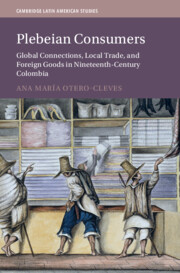 Plebeian Consumers
Plebeian Consumers Demanding Consumers, Active Citizens
Published online by Cambridge University Press: 18 December 2024
Chapter 4 studies the political, cultural, and economic impact of foreign machetes and other agricultural tools. It shows how popular men and women’s expert knowledge about these goods was not transferred from above or received from abroad but inherited and acquired in practice. Peasants and muleteers used machetes to clear the land, grow their crops, and travel the country; artisans, bogas, and smallholders, to defend their honor, their lives, and their property. As this chapter shows, over the course of the nineteenth century, foreign tools, especially the machete, reshaped these popular actors’ collective identities and underscored their contribution to the nation’s material improvement and progress – not only as part of the country’s labor force but as consumers themselves. Although these Plebeian consumers might have had limited choices due to their limited purchasing power, this did not preclude them from appropriating foreign tools, expressing dissatisfaction with certain agricultural implements, and seeking ways to access the ones they liked and preferred. Most important, machetes allowed them to shape and reiterate their citizenship on the ground. As such, Colombia’s popular consumers became not only critical agents in the global market but active and productive citizens of the new republic.
To save this book to your Kindle, first ensure no-reply@cambridge.org is added to your Approved Personal Document E-mail List under your Personal Document Settings on the Manage Your Content and Devices page of your Amazon account. Then enter the ‘name’ part of your Kindle email address below. Find out more about saving to your Kindle.
Note you can select to save to either the @free.kindle.com or @kindle.com variations. ‘@free.kindle.com’ emails are free but can only be saved to your device when it is connected to wi-fi. ‘@kindle.com’ emails can be delivered even when you are not connected to wi-fi, but note that service fees apply.
Find out more about the Kindle Personal Document Service.
To save content items to your account, please confirm that you agree to abide by our usage policies. If this is the first time you use this feature, you will be asked to authorise Cambridge Core to connect with your account. Find out more about saving content to Dropbox.
To save content items to your account, please confirm that you agree to abide by our usage policies. If this is the first time you use this feature, you will be asked to authorise Cambridge Core to connect with your account. Find out more about saving content to Google Drive.